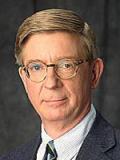
At the beginning of his long and well-lived life, George Herbert Walker Bush, who in politics was always prosaic, acquired, by way of a grandfather, the name of a British poet and priest (George Herbert, 1593-1633). He acquired much else from family inheritance.
The future 41st president was descended from a governor of the Federal Reserve Bank of Cleveland -- from financier George Herbert Walker, whose name is on golf's Walker Cup -- and from a U.S. senator -- his father Prescott, of Brown Brothers Harriman, the Wall Street investment house whose partners included Robert Lovett, a future secretary of defense.
This was the world from which Bush came into a life whose trajectory often left him caught between the worlds of the old East Coast Republicanism of banks, railroads and good works of noblesse oblige, and the New Right Republicanism of the Sun Belt. He had an easy social grace imparted by Greenwich Country Day School, Andover and Yale, yet seemed forever uneasy about where he was and how he got there.
Rejecting family entreaties that he go to Yale before going to war, he enlisted on his 18th birthday and promptly became the Navy's youngest commissioned aviator, compiling 126 carrier landings and 58 missions. After Yale, he spurned a Wall Street career and with his wife -- the former Barbara Pierce, a descendant of the 14th president, Franklin Pierce -- headed in his Studebaker for the West Texas oil patch. But he took Wall Street with him in the form of connections and capital that helped launch the Bush-Overbey Oil Development Co.
Business success brought him to Houston; boredom with business brought him to politics. He was 39 when he announced he would seek the Republican nomination to oppose Sen. Ralph Yarborough in 1964, the year Barry Goldwater, harbinger of the Republicans' future, would be at the top of the ticket.
Bush took on the coloration of Texas' first generation of Republicanism. He endorsed right-to-work laws and denounced Medicare -- it was coming in 1965 -- as "socialistic." He opposed the 1964 civil rights bill on the grounds that it would "make the Department of Justice the most powerful police force in the nation." He said the bill's public accommodations provisions were unconstitutional, and whereas the law might "protect 14 percent of the people," he was equally concerned about "the other 86 percent."
While Bush criticized Walter Reuther of the United Auto Workers because he had "donated $50 to the militant Dr. Martin Luther King Jr.," Bush's campaign supporters sang, "The sun's going to shine in the Senate someday/George Bush is going to chase them liberals away." He lost.
And he repented and revised himself. Running successfully for Congress in 1965-1966, he endorsed Lyndon Johnson's Great Society agenda as meaning "a better life for all."
Richard Nixon considered Bush as a running mate in 1968, but chose Spiro Agnew. In 1970, Bush's plans for a rematch with Yarborough crashed when Lloyd Bentsen defeated Yarborough in the Democratic primary. So Bush ran to Bentsen's left -- e.g., supporting gun control -- and again lost. He was 46, twice defeated, and his political future, if any, depended on the patronage of others, beginning with Nixon, who made him ambassador to the U.N. and then chairman of the Republican National Committee when the job involved defending Nixon against Watergate accusations, which Bush dutifully did. President Gerald Ford considered Bush as his vice president, but chose Nelson Rockefeller. He became chief envoy to China when Secretary of State Henry Kissinger's close attention to that country made the envoy's job merely ceremonial. Then, by becoming CIA director, Bush removed himself from consideration as Ford's 1976 running mate.
Seeking the 1980 Republican presidential nomination, Bush ran as the moderate alternative to Reagan, who nevertheless then positioned Bush, as his vice president, for a 1988 candidacy. Announcing it, Bush said: "I am not a mystic and I do not yearn to lead a crusade." Having lost to Robert Dole in Iowa, Bush saved his candidacy by winning New Hampshire with yet more role playing -- driving an 18-wheeler around a truck stop's parking lot.
In 1989, as president, he could at last be himself. He was, by then, an Eisenhower Republican, whose prudence was displayed first when the Berlin Wall came down, next when Saddam Hussein invaded Kuwait and Bush, when expelling him, stopped short of invading Iraq. Presiding over the orderly end of the Cold War and the vast coalition for Desert Storm, Bush earned the lasting admiration of a discerning posterity, a judgment more important than the one rendered by the undiscerning electorate that in 1992 limited him to one term.
George Will's email address is georgewill@washpost.com.
(c) 2018, Washington Post Writers Group


